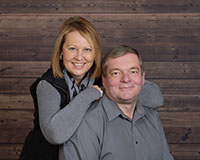
When Kim Reddin’s relationship grew serious with her future husband, John, the 13-year age difference didn’t give her pause. Both her maternal grandparents and great-grandparents had a 13-year age gap. At age 25, she knew the fit was right, and recognized at some point in her life there could be a price to pay due to their age difference.
She just didn’t know she’d be called on to pay it so soon.
Kim and John’s lives began to shift in 2012 when John’s mother, Gladys, turned 80 and began getting lost while driving. Gladys was confused and frightened, and she didn’t put up a fight when her son took away her car keys. While never formally diagnosed, Gladys lived with symptoms of dementia. Not totally unexpected, since her mother had passed away with a form of dementia. So had John’s father, but none were officially diagnosed, nor did they show symptoms until after age 75.
Kim and John were a busy couple with two grown sons living out of state, but the 40-year-old Kim and her 53-year-old husband gradually took on more and more care for Gladys.
Changes came in 2015 when John received a much-anticipated promotion in his retail management career. But the new job required John to travel extensively, so Kim became the primary caregiver for her mother-in-law on evenings and weekends with additional daytime help. The burden of work and caregiving soon required Kim and John to move Gladys into a nursing home with a dementia wing.
Yet more changes
Leading a busy life with a traveling husband, a full-time job and full-time caregiving probably kept Kim from focusing on anything that didn’t require immediate attention. After Gladys’ death in the spring of 2016, Kim got involved with the Alzheimer’s Association to help raise funds for a cure. She developed contacts there she didn’t know she’d need.
After Gladys passed away, Kim turned her attention to John. All was not right.
John’s attention to detail and ability to focus on certain things seemed noticeably different to Kim. He was more easily agitated, and a few times seemed to experience panic attacks. Initially, Kim and John thought sleep apnea and hormone imbalances were to blame, and so did his medical provider.
When those issues were addressed, but John’s symptoms did not improve, Kim pushed for additional testing. Nearly a year later, at age 57, John was diagnosed with vascular ischemia and Alzheimer’s disease.
Looking back, Kim realizes she may have noticed the first signs of Alzheimer’s in John as early as 2014 or 2015, but at the time didn’t suspect Alzheimer’s.
“I had no idea dementia could affect people in their 50s and 60s,” she said.
The impacts of Alzheimer’s
John’s diagnosis has sent ripples through the family. Even before the diagnosis was official, the symptoms and their impact on his work performance caused him to step down from his salaried management position to a full-time hourly role. He currently works 30 hours per week.
“Like many men, John placed a lot of his self-worth in his career. Stepping down from a role he aspired to was not easy for him,” Kim said. “After a few job changes, he is glad to work in a role with less stress.”
John’s diagnosis has led to other changes. In 2018, Kim changed jobs so she could better care for John.
“A lot of decisions I make now factor in his health condition,” said Kim. “When I married an older man, I knew I would probably be a caregiver at some point, but certainly not in my 40s.”
While caregiving for her mother-in-law has given Kim experience in understanding Alzheimer’s, there’s other factors to consider.
“My experience with Gladys has helped me recognize and deal better with some of the behaviors that occur with dementia,” she said, “but losing my best friend and spouse at this stage is life-altering. While it’s hard to say how much time we have left together, the quality and quantity of that time is nothing like we pictured and were planning.”
Not only that, but given the family history on their father’s side, both sons are very concerned about the likelihood of having dementia in their lifetimes.
Ask for help
Perhaps the best advice that Kim has received to cope with her family’s challenges is to not try to manage alone.
She has found help through two Alzheimer’s Association support groups: one for couples and one younger-onset group. And she has continued to remain active in Walk to End Alzheimer’s fundraising.
“You need to ask for help,” she said. “Don’t shoulder this disease by yourself.”
And what would she offer to another family facing a similar diagnosis?
“First, find good medical health professionals, both physical and mental,” she said. “Then, get your loved one’s affairs in order while they still have the capacity to tell you their wants and wishes.”
And she recommends getting the support of family, friends and others for you and your loved one.
“The Alzheimer’s Association is the first resource I would encourage them to contact,” she said.
And then, coronavirus…
Like everyone else, Kim and John saw their lives change with the coronavirus pandemic and lockdown.
“We had planned to spend Easter with the boys and their families in Dallas. We are not sure when we’ll see them,” Kim says. “The main challenge during the pandemic is John’s short-term memory loss. He forgets why places are closed.”
For now, Kim and John are pressing forward. Both continue to work.
“We are blessed that our income has not been affected,” she said. But she knows there are more changes yet to come.
Alzheimer's Association
The Alzheimer's Association leads the way to end Alzheimer's and all other dementia — by accelerating global research, driving risk reduction and early detection, and maximizing quality care and support. Our vision is a world without Alzheimer's and all other dementia.™ For more information, visit www.alz.org or call the 24/7 Helpline at 800.272.3900.